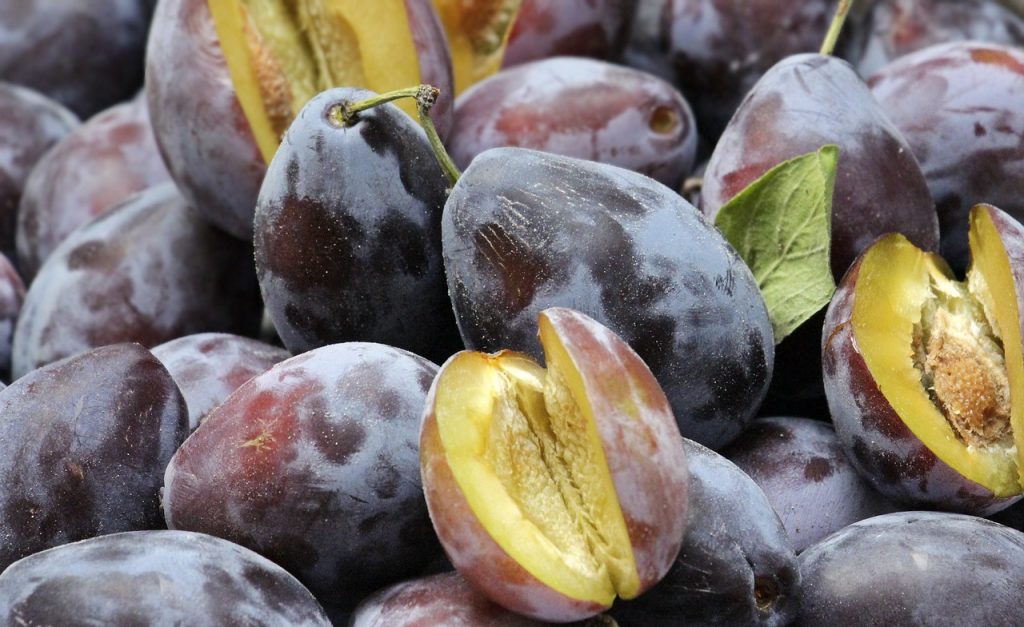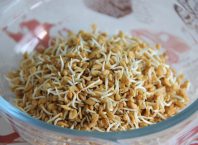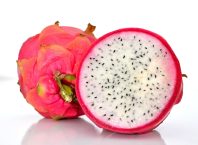Table of Contents
Plums are a delicious and versatile fruit that have been enjoyed for centuries. Whether eaten fresh or dried, plums are packed with nutrients and health benefits. In fact, research has shown that plums may have a range of science-backed health benefits that can improve your overall health and wellbeing. In this article, we’ll explore the top science-backed health benefits of plums and how you can incorporate this fruit into your diet.

What are Plums?
Plums are a type of fruit that are part of the Prunus genus, which also includes other stone fruits such as peaches, nectarines, and apricots. They are typically round or oval in shape and can range in color from red to purple to yellow. Plums are known for their sweet and juicy flesh and are enjoyed both fresh and dried. They are grown in many parts of the world, with the largest producers being China, the United States, and Serbia. Plums are not only delicious but also packed with essential nutrients, making them a healthy and nutritious addition to any diet.
Plums come in many different varieties, each with its own unique flavor and texture. Some popular types of plums include the Santa Rosa, Black Beauty, and Elephant Heart. Plums are typically in season during the summer months, although they can often be found year-round in supermarkets.
In addition to their delicious taste, plums are also packed with essential nutrients. As mentioned earlier, they are a great source of dietary fiber, which is important for digestive health and can help to regulate blood sugar levels. Plums also contain a range of vitamins and minerals, including vitamins A, C, and K, and minerals such as potassium, magnesium, and manganese.
Nutritional Facts of Plum
| Nutrient | Amount | Percentage of the Daily Value (DV) |
| Carbohydrate | 7.54 g | 3% |
| Fiber | 0.9 g | 3% |
| Protein | 0.46 g | 1% |
| Iron | 0.11 mg | 1% |
| Potassium | 103.62 mg | 2% |
| Magnesium | 4.62 mg | 1% |
| Manganese | 0.034 mg | 1% |
| Phosphorus | 10.56 mg | 2% |
| Copper | 0.038 mg | 4% |
| Zinc | 0.07 mg | 1% |
| Niacin | 0.275 mg | 2% |
| Pantothenic acid | 0.089 mg | 2% |
| Riboflavin | 0.017 mg | 1% |
| Thiamine | 0.018 mg | 2% |
| Vitamin A | 227.70 IU | 5% |
| Vitamin C | 6.3 mg | 7% |
| Vitamin B6 | 0.019 mg | 1% |
| Vitamin E | 0.17 mg | 1% |
| Vitamin K | 4.2 mcg | 4% |
Health Benefits Of Plums
Improved Digestion
Plums are an excellent source of fiber, which is essential for maintaining good digestive health. A single plum contains around 2 grams of fiber, which is around 8% of your daily recommended intake. Fiber helps to promote regular bowel movements and can prevent constipation and other digestive issues. Additionally, plums contain sorbitol, a natural sugar alcohol that can act as a mild laxative, helping to relieve constipation
Lower Blood Sugar Levels
Plums have a low glycemic index, which means they don’t cause a rapid increase in blood sugar levels. This makes them an excellent fruit for people with diabetes or anyone looking to maintain stable blood sugar levels. Plums contain compounds called phenolic acids and flavonoids, which have been shown to help regulate blood sugar levels and improve insulin sensitivity.
Anti-Inflammatory Properties
Plums contain a range of antioxidants, including vitamin C, vitamin E, and beta-carotene. These antioxidants can help to reduce inflammation in the body and protect against oxidative stress, which can lead to chronic diseases like cancer and heart disease. Additionally, plums contain polyphenols, which have been shown to have anti-inflammatory properties and may help to reduce the risk of chronic diseases.
Improved Bone Health
Plums are a good source of vitamin K, which is essential for maintaining strong and healthy bones. Vitamin K helps to activate proteins that are involved in bone metabolism, which can improve bone density and reduce the risk of fractures. Additionally, plums contain boron, a mineral that has been shown to help prevent osteoporosis and improve bone health.
Boosted Immune System
Plums are a rich source of vitamin C, which is essential for a healthy immune system. Vitamin C helps to stimulate the production of white blood cells, which are responsible for fighting off infections and diseases. Additionally, vitamin C is a powerful antioxidant that can help to protect against oxidative stress and support overall health and wellbeing.
Regulating Blood Sugar Levels
Plums have a low glycemic index, which means they can help regulate blood sugar levels. This is especially beneficial for people with diabetes, as it can help prevent spikes and dips in blood sugar levels. The fiber in plums also slows down the absorption of sugars into the bloodstream, further promoting stable blood sugar levels. Additionally, plums contain compounds called anthocyanins, which have been shown to improve insulin sensitivity and reduce the risk of developing type 2 diabetes.
Improved Bone Health
Plums are a rich source of nutrients that are essential for maintaining strong and healthy bones. One of these nutrients is vitamin K, which is necessary for proper bone formation and mineralization. Plums also contain calcium, magnesium, and phosphorus, which are all important for building and maintaining bone density.
Research has shown that consuming plums and other stone fruits may have a protective effect on bone health. A study published in the British Journal of Nutrition found that postmenopausal women who consumed dried plums had a significantly lower risk of developing osteoporosis compared to those who did not consume plums. Another study published in the Journal of Medicinal Food found that plum extract increased bone density and improved bone quality in rats.
Reduced Inflammation in the Gut
Plums are rich in antioxidants, including phenolic compounds, which have been shown to have anti-inflammatory effects. These compounds can help reduce inflammation in the gut, which is beneficial for people with digestive disorders such as inflammatory bowel disease (IBD).
A study published in the Journal of Nutritional Biochemistry found that consuming plum extract reduced inflammation and oxidative stress in the colons of rats with induced colitis. Another study published in the Journal of Medicinal Food found that consuming dried plums improved markers of inflammation in the colon of rats with induced colitis.
While more research is needed to fully understand the effects of plums on gut health in humans, these studies suggest that plums may have potential as a natural remedy for reducing inflammation in the gut.
Improved Brain Function
Plums contain several nutrients that are important for brain function, including vitamins C and K, potassium, and copper. These nutrients help support healthy brain cells and neurotransmitter function, which can improve cognitive performance.
In addition to these nutrients, plums also contain phenolic compounds that have been shown to have neuroprotective effects. These compounds can help prevent oxidative stress and inflammation in the brain, which are both associated with cognitive decline and neurological disorders such as Alzheimer’s disease.
A study published in the Journal of Medicinal Food found that consuming dried plums improved cognitive function in middle-aged rats. Another study published in the Journal of Nutrition, Health and Aging found that consuming stone fruits such as plums was associated with improved cognitive function in older adults.
Reduced Risk of Obesity

Plums are a low-calorie fruit that are high in fiber, which can help promote feelings of fullness and reduce overall calorie intake. This makes them a great addition to a weight loss or weight management diet.
In addition to their high fiber content, plums also contain bioactive compounds such as chlorogenic acid, which has been shown to have anti-obesity effects. A study published in the Journal of Medicinal Food found that consuming plum extract reduced body weight, fat mass, and inflammation in mice fed a high-fat diet.
While more research is needed to fully understand the effects of plums on weight management in humans, these studies suggest that incorporating plums into a healthy diet may help reduce the risk of obesity and improve overall health.
Reduced Risk of Stroke
Studies have suggested that consuming plums may help reduce the risk of stroke. This is thought to be due to their high content of antioxidants and anti-inflammatory compounds, which can help protect against damage to the blood vessels in the brain.
A study published in the journal Stroke found that women who consumed the highest amounts of flavonoids, including those found in plums, had a significantly lower risk of stroke compared to those who consumed the lowest amounts. Another study published in the British Journal of Nutrition found that consuming dried plums (prunes) improved cardiovascular health markers, including blood pressure and cholesterol levels, which are also risk factors for stroke.
While more research is needed to fully understand the effects of plums on stroke risk, these studies suggest that incorporating plums into a healthy diet may have protective effects on the brain and cardiovascular system.
Improved Eye Health
Plums are rich in nutrients that are important for maintaining healthy eyes, including vitamins A and C, beta-carotene, and lutein. These nutrients can help protect against damage caused by free radicals and UV radiation, which can contribute to the development of eye diseases such as cataracts and macular degeneration.
Lutein, in particular, is a type of carotenoid that is concentrated in the retina of the eye, where it helps protect against damage from blue light. Studies have suggested that consuming lutein-rich foods, such as plums, may help reduce the risk of age-related macular degeneration, which is a leading cause of vision loss in older adults.
A study published in the Journal of Agricultural and Food Chemistry found that consuming plum extract reduced oxidative stress in the eyes of rats exposed to UV radiation. Another study published in the International Journal of Food Sciences and Nutrition found that consuming dried plums (prunes) improved antioxidant status and reduced inflammation in the eyes of healthy adults.
Reduced Risk of Gallstones
Gallstones are small, hard deposits that can form in the gallbladder, a small organ located near the liver. They can cause pain, inflammation, and other complications. Some studies have suggested that consuming plums may help reduce the risk of gallstones.
A study published in the European Journal of Nutrition found that women who consumed the highest amounts of anthocyanins, a type of flavonoid found in plums, had a lower risk of developing gallstones compared to those who consumed the lowest amounts.
It’s thought that the fiber and antioxidants in plums may help regulate bile acid metabolism and prevent the formation of gallstones. While more research is needed to fully understand the effects of plums on gallstone risk, these studies suggest that incorporating plums into a healthy diet may have protective effects on the gallbladder.
Rich in Tocopherol
Plums and prunes are both rich in antioxidants, which are compounds that protect your cells from damage caused by harmful molecules called free radicals. Here are some of the antioxidants found in plums and prunes:
Vitamin C
Plums and prunes are good sources of vitamin C, which is a powerful antioxidant that helps protect your cells from damage and supports your immune system.
Polyphenols
Plums and prunes are rich in polyphenols, which are a type of antioxidant found in many plant-based foods. Polyphenols have been linked to a reduced risk of chronic diseases like heart disease and cancer.
Carotenoids
Plums and prunes contain carotenoids, which are pigments that give fruits and vegetables their vibrant colors. Some carotenoids, like beta-carotene, have antioxidant properties and are important for eye health.
Anthocyanins
Plums and prunes are particularly rich in anthocyanins, which are a type of polyphenol that gives fruits their deep red, purple, or blue colors. Anthocyanins have been linked to improved heart health, reduced inflammation, and a lower risk of certain types of cancer.
How to Incorporate Plum into Your Diet?
Eat them fresh
Plums make a great snack on their own. Simply wash them, remove the pit, and enjoy!
Add them to your yogurt or oatmeal
Plums can be a tasty addition to your morning yogurt or oatmeal. Cut them up into small pieces and mix them in for some added sweetness and nutrition.
Make a plum smoothie
Blend fresh plums with some yogurt, milk, and ice for a refreshing and healthy smoothie.
Bake them into desserts
Plums can be used in a variety of desserts, from pies and cobblers to cakes and tarts. Look up some plum dessert recipes and get creative in the kitchen!
Make a plum sauce
Plums can be simmered with some sugar, cinnamon, and other spices to make a delicious sauce that can be used as a topping for pancakes, waffles, or even grilled meats.
Adding them to smoothies or juices
Plum and Banana Smoothie
Blend 1 ripe banana, 2-3 ripe plums (pitted and chopped), 1 cup of almond milk, and a handful of ice cubes until smooth.
Plum and Kale Smoothie
Blend 2-3 ripe plums (pitted and chopped), 1 cup of chopped kale, 1 ripe banana, 1/2 cup of orange juice, and a handful of ice cubes until smooth.
Plum and Ginger Juice
Juice 2-3 ripe plums (pitted), 1 inch of fresh ginger root, and 1/2 lemon. Serve over ice for a refreshing and healthy drink.
Plum and Carrot Juice
Juice 2-3 ripe plums (pitted), 2-3 medium carrots, and 1/2 inch of fresh ginger root. This delicious and nutritious juice is packed with antioxidants and vitamin C.
Side Effects of Plums
Allergic Reactions
Some people may be allergic to plums or other stone fruits, such as peaches and cherries. Symptoms of an allergic reaction can include hives, swelling, difficulty breathing, and gastrointestinal distress.
Digestive Issues
While plums are high in fiber and can promote healthy digestion, consuming too many plums at once can cause digestive issues such as bloating, gas, and diarrhea.
Dental Issues
Plums are high in natural sugars, which can contribute to tooth decay and other dental problems if consumed in excess.
Interaction with Medications
Plums contain compounds that can interact with certain medications, such as blood thinners and antibiotics. If you are taking any medications, it is important to talk to your doctor before adding plums to your diet.
High in Oxalates
Plums are high in oxalates, which can contribute to the formation of kidney stones in some people. If you have a history of kidney stones or are at risk for them, it is best to limit your intake of plums.
FAQs
Q: Can eating plums help with weight loss?
A: Yes, plums are a low-calorie fruit that are high in fiber, which can help to promote feelings of fullness and reduce appetite. Eating plums as part of a balanced diet can support weight loss efforts.
Q: Are dried plums (prunes) as healthy as fresh plums?
A: Yes, dried plums (prunes) have many of the same health benefits as fresh plums. However, they are higher in calories and sugar, so it’s important to consume them in moderation.
Q: How can I incorporate more plums into my diet?
A: There are many ways to enjoy plums, from eating them fresh as a snack to adding them to smoothies or salads. You can also use plums to make delicious jams, chutneys, and baked goods.
Conclusion
Plums are a delicious and nutritious fruit that offer a range of science-backed health benefits. From improved digestion to lower blood sugar levels, from improved bone health to a boosted immune system, incorporating plums into your diet can have a positive impact on your overall health and wellbeing. Whether you eat them fresh or dried, plums are a great source of fiber, antioxidants, and vitamins that can support a healthy lifestyle. So next time you’re looking for a healthy and tasty snack, consider reaching for a plum and reaping the many science-backed health benefits of plums it has to offer.















